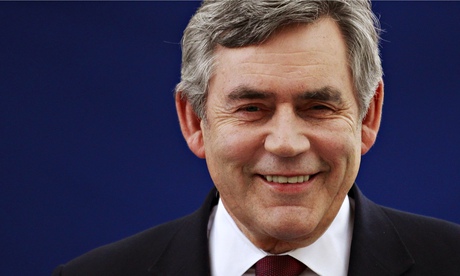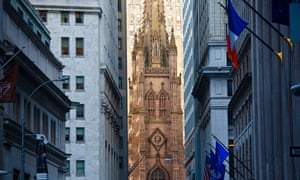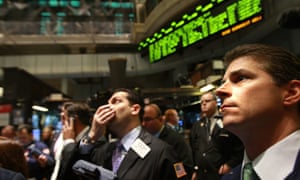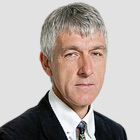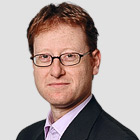'People will forgive you for being wrong, but they will never forgive you for being right - especially if events prove you right while proving them wrong.' Thomas Sowell
Search This Blog
Tuesday, 21 May 2024
Friday, 18 August 2023
A level Economics: UK's inflation is due to rise in corporate profit-taking
Figures give fuel to claims that profiteering has played a big part in the UK’s high levels of inflation writes Phillip Inman in The Guardian
British companies have boosted their profitability, according to the latest official figures, insulating themselves against cost pressures and fuelling claims that profiteering has played a big part in the UK’s inflation story.
In a week when Joe Biden said he was only winning the war against inflation in the US because corporate profits were declining, figures released on Thursday by the Office for National Statistics showed UK business profits increased in the first quarter of 2023.
Manufacturing firms increased their net rate of return to 8.8% in the first quarter, from 8.4% in the fourth quarter of 2022. Services companies, which account for about three-quarters of economic activity, increased their net rate of return to 16.1%, an increase of 0.4 percentage points from the last three months of 2022.
The rate of return is a measure of profitability that shows the margin between operating profits and the cost of assets used to generate those profits. Unions have accused firms of putting up prices by more than the rise in their costs, a trend nicknamed greedflation.
It is a hot topic because the Bank of England has consistently said the small ups and downs registered by the ONS in its calculations of corporate profitability show little evidence of profiteering. It has repeatedly urged workers to restrain wage demands and played down the need to tell companies to restrain price rises.
On the other side of the argument stand a growing number of academics, thinktanks and unions.
The TUC general secretary, Paul Novak, said he was shocked by the ONS figures, which he claimed showed “a culture of entitlement is alive and well” among the large corporations that he said were mostly to blame for higher prices.
Sharon Graham, the head of the Unite union, arguably credited with doing more than anyone in the UK to promote research into corporate profits, said companies were exploiting a crisis.
Philip King, a former government adviser and small business commissioner until 2021, said many small and medium-sized companies would wonder what the fuss was about. He said it was clear from the figures that “companies are maintaining their profitability despite the difficult trading conditions they have faced”, and it was large businesses that would be to blame. These “typically have more flexibility when it comes to increasing prices and cutting costs”, he said.
The International Monetary Fund (IMF), the Organisation for Economic Co-operation and Development (OECD) and many leading academics say steady profit margins show businesses are doing better than any other participants in the economy, in particular workers.
An OECD report last month found average profit margins in the UK increased by almost a quarter between the end of 2019 and early 2023. Stefano Scarpetta, a director of the OECD, said it was “somewhat unusual that in a period of slowdown in economic activity we see profit picking up”.
George Dibb, an economist at the IPPR thinktank, said the Bank of England was “plain wrong” to consider steady profit margins a non-story.
On closer inspection the headline average is if anything worse than it first appears. Overall, the net rate of return for all non-financial businesses – a measure that excludes banks and insurance companies but includes North Sea oil and gas firms – increased from 9.8% in the last quarter of 2022 to 9.9% in the first quarter. That shows margins remained consistent through one of the worst winters for cost of living rises and cuts in disposable incomes for several generations.
However, excluding North Sea oil and gas firms, which showed a slump in profitability in the first quarter as energy prices fell from their peaks, dragging down the average, the level of profitability for most firms jumped from 9.6% in the last quarter of 2022 to 10.6% in the first quarter of 2023.
Richard Murphy, a professor of accounting at the University of Sheffield, said low wage rises in most sectors outside financial services meant large companies were probably doing much better than smaller ones.
Murphy said half of all UK company profits were generated by small and medium-sized companies and the other half by a few thousand larger firms.
Another interest rate rise is expected next month and the main reason given by the Bank will be that wages are rising too quickly, not that profits are rising too quickly. It is a stance that is going to become increasingly contentious.
Tuesday, 30 May 2023
How to treat the Fraud Epidemic!
It marks a spectacular fall from grace for a one-time Silicon Valley star. This week a court in California ruled that, Hail Mary appeals notwithstanding, Elizabeth Holmes must report to prison on May 30th to begin serving an 11-year sentence for fraud. Theranos, the startup Ms Holmes had founded in 2003, was worth $9bn at its peak but crashed after its much-vaunted blood-testing technology was shown not to work, and she ended up in the dock for deceiving investors.
Theranos is one of a long list of financial scandals that have made headlines in recent years. Also among these are the frauds at Wirecard, a German payments processor, and Abraaj, a Dubai-based private-equity firm, various crypto-heists, and a bonanza of misappropriation of government handouts to businesses during the covid-19 pandemic. So many frauds are there, and so big are the biggest, that pilfering a billion dollars does not guarantee a global headline. Chances are you haven’t heard of Outcome Health, a Chicago-based health-tech firm whose former ceo and president were recently convicted of defrauding clients, lenders and investors of roughly that amount of money.
Beneath the blockbuster frauds in the billions of dollars is an alarmingly long tail of smaller financial scams. Taken together, these add up to a huge global problem. Research by Crowe, a financial-advisory firm, and the University of Portsmouth, in England, suggests that fraud costs businesses and individuals across the world more than $5trn each year. That is nearly 60% of what the world spends annually on health care.
The drivers of fraud are many and complex. Sometimes it is down to pure greed. Sometimes it begins with a relatively innocuous attempt to paper over a small financial crack but spirals when that initial effort fails; some believe that’s how it started with Bernie Madoff’s giant Ponzi scheme. Market pressure and a desire to exceed analysts’ expectations can also play a part: after the global financial crisis of 2007-09, ge was fined $50m for artificially smoothing its profits to keep investors sweet. Accounting ruses like this, which fall in a grey area, are more common than outright fraud. Among tech startups there is even an established term for manipulating the numbers to buy you time to navigate the rocky road to financial respectability: “fake it till you make it.”
Fraud is an all-weather pursuit. Economic booms help fraudsters conceal creative accounting, such as exaggerated revenues. Recessions expose some of this wrongdoing, but they also spawn fresh shenanigans. As funding dries up, some owners and managers cook the books to stay in business. When survival is at stake, the line between what is acceptable and unacceptable when disclosing information or booking sales can become blurred.
World events can stoke fraud, too. At the height of the pandemic, an estimated $80bn of American taxpayer money handed out under the Paycheck Protection Programme, set up to assist struggling businesses, was stolen by fraudsters. The covid-induced increase in remote working has created new opportunities for miscreants. The 2022 kpmg Fraud Outlook concludes that the surge in working from home has reduced businesses’ ability to monitor employees’ behaviour. Geopolitics affects fraud, too. nato countries experienced four times as many email-phishing attacks from Russia in 2022 as they did in 2020. Cybercrimes such as ransomware attacks have already transferred a staggering amount of wealth to illicit actors. The costs to businesses range from the theft of data, intellectual property and money to post-attack disruption, lost productivity and systems upgrades.
It is panglossian to think fraud can be eliminated, but more can be done to reduce it. Corporate boards and investors need to ask more questions. Investors are often too quick to take comfort from the presence of big names on the list of owners and directors. Some were clearly wowed by Theranos’s star-studded board, whose members included two former us secretaries of state and the ex-boss of Wells Fargo, a big bank.
Regulators need to be more sceptical, too. America’s Securities and Exchange Commission brushed aside a detailed and devastating analysis of Madoff’s business provided by a concerned fund manager, Harry Markopolos. Germany’s financial-markets regulator was similarly dismissive of the short-sellers and journalists who called out Wirecard.
The most effective change would be to do more to encourage whistleblowers. Falsified financial statements must start with someone who notices fraudulent acts. When fraud happens, many people ask “Where were the auditors?”. But the question should be “Where were the whistleblowers?”
As important as sceptical investors, regulators and journalists can be, much fraud would be undetectable without someone on the inside willing to spill the beans. Research shows that more than 40% of frauds are discovered by a whistleblower. The Wirecard scandal came to light largely because of the bravery of Pav Gill, one of the company’s lawyers, who went to the press with his concerns. The Theranos fraud was brought to the attention of the authorities and the Wall Street Journal by whistleblowing employees (one of whom was the grandson of a former political bigwig on the board).
Too often, companies seek to silence whistleblowers, or portray them as mad, bad or both: Wirecard, for instance, fought back ferociously against Mr Gill’s allegations and the journalists who investigated them. Organisations need to create safe spaces where employees can voice their concerns about wrongdoing. Internal reporting channels need to be robust, and employees educated on how to use them. Creating an environment where whistleblowers are celebrated, not vilified, is critical. Companies should worry more about anyone who can circumvent the controls, such as senior leaders or star employees, than about those inclined to raise concerns.
Governments, too, could do more. Protections for whistleblowers have been recognised as part of international law since 2003 when the United Nations adopted the Convention Against Corruption, and this has since been ratified by 137 countries. In reality, legal protections are patchy. They are strongest in America, which offers bounties to whistleblowers who provide information that leads to fines or imprisonment. In much of Europe, and elsewhere, the law is still too soft on those who muzzle or retaliate against alarm-ringers.
Fraud can be reduced. But first we must better understand who commits it, educate people on how to report it, and then ensure that policies protect those who choose to come forward. Until we do, financial crime will remain a multi-trillion-dollar scourge.
Tuesday, 11 July 2017
How economics became a religion
Although Britain has an established church, few of us today pay it much mind. We follow an even more powerful religion, around which we have oriented our lives: economics. Think about it. Economics offers a comprehensive doctrine with a moral code promising adherents salvation in this world; an ideology so compelling that the faithful remake whole societies to conform to its demands. It has its gnostics, mystics and magicians who conjure money out of thin air, using spells such as “derivative” or “structured investment vehicle”. And, like the old religions it has displaced, it has its prophets, reformists, moralists and above all, its high priests who uphold orthodoxy in the face of heresy.
This was our heaven, and richly did we reward the economic priesthood, with status, wealth and power to shape our societies according to their vision. At the end of the 20th century, amid an economic boom that saw the western economies become richer than humanity had ever known, economics seemed to have conquered the globe. With nearly every country on the planet adhering to the same free-market playbook, and with university students flocking to do degrees in the subject, economics seemed to be attaining the goal that had eluded every other religious doctrine in history: converting the entire planet to its creed.
Yet if history teaches anything, it’s that whenever economists feel certain that they have found the holy grail of endless peace and prosperity, the end of the present regime is nigh. On the eve of the 1929 Wall Street crash, the American economist Irving Fisher advised people to go out and buy shares; in the 1960s, Keynesian economists said there would never be another recession because they had perfected the tools of demand management.
The 2008 crash was no different. Five years earlier, on 4 January 2003, the Nobel laureate Robert Lucas had delivered a triumphal presidential address to the American Economics Association. Reminding his colleagues that macroeconomics had been born in the depression precisely to try to prevent another such disaster ever recurring, he declared that he and his colleagues had reached their own end of history: “Macroeconomics in this original sense has succeeded,” he instructed the conclave. “Its central problem of depression prevention has been solved.”
No sooner do we persuade ourselves that the economic priesthood has finally broken the old curse than it comes back to haunt us all: pride always goes before a fall. Since the crash of 2008, most of us have watched our living standards decline. Meanwhile, the priesthood seemed to withdraw to the cloisters, bickering over who got it wrong. Not surprisingly, our faith in the “experts” has dissipated.
Hubris, never a particularly good thing, can be especially dangerous in economics, because its scholars don’t just observe the laws of nature; they help make them. If the government, guided by its priesthood, changes the incentive-structure of society to align with the assumption that people behave selfishly, for instance, then lo and behold, people will start to do just that. They are rewarded for doing so and penalised for doing otherwise. If you are educated to believe greed is good, then you will be more likely to live accordingly.
The hubris in economics came not from a moral failing among economists, but from a false conviction: the belief that theirs was a science. It neither is nor can be one, and has always operated more like a church. You just have to look at its history to realise that.
The American Economic Association, to which Robert Lucas gave his address, was created in 1885, just when economics was starting to define itself as a distinct discipline. At its first meeting, the association’s founders proposed a platform that declared: “The conflict of labour and capital has brought to the front a vast number of social problems whose solution is impossible without the united efforts of church, state and science.” It would be a long path from that beginning to the market evangelism of recent decades.
Yet even at that time, such social activism provoked controversy. One of the AEA’s founders, Henry Carter Adams, subsequently delivered an address at Cornell University in which he defended free speech for radicals and accused industrialists of stoking xenophobia to distract workers from their mistreatment. Unknown to him, the New York lumber king and Cornell benefactor Henry Sage was in the audience. As soon as the lecture was done, Sage stormed into the university president’s office and insisted: “This man must go; he is sapping the foundations of our society.” When Adams’s tenure was subsequently blocked, he agreed to moderate his views. Accordingly, the final draft of the AEA platform expunged the reference to laissez-faire economics as being “unsafe in politics and unsound in morals”.
Once a principle is established as orthodox, its observance is enforced in much the same way that a religious doctrine maintains its integrity: by repressing or simply eschewing heresies. In Purity and Danger, the anthropologist Mary Douglas observed the way taboos functioned to help humans impose order on a seemingly disordered, chaotic world. The premises of conventional economics haven’t functioned all that differently. Robert Lucas once noted approvingly that by the late 20th century, economics had so effectively purged itself of Keynesianism that “the audience start(ed) to whisper and giggle to one another” when anyone expressed a Keynesian idea at a seminar. Such responses served to remind practitioners of the taboos of economics: a gentle nudge to a young academic that such shibboleths might not sound so good before a tenure committee. This preoccupation with order and coherence may be less a function of the method than of its practitioners. Studies of personality traits common to various disciplines have discovered that economics, like engineering, tends to attract people with an unusually strong preference for order, and a distaste for ambiguity.
The irony is that, in its determination to make itself a science that can reach hard and fast conclusions, economics has had to dispense with scientific method at times. For starters, it rests on a set of premises about the world not as it is, but as economists would like it to be. Just as any religious service includes a profession of faith, membership in the priesthood of economics entails certain core convictions about human nature. Among other things, most economists believe that we humans are self-interested, rational, essentially individualistic, and prefer more money to less. These articles of faith are taken as self-evident. Back in the 1930s, the great economist Lionel Robbins described his profession in a way that has stood ever since as a cardinal rule for millions of economists. The field’s basic premises came from “deduction from simple assumptions reflecting very elementary facts of general experience” and as such were “as universal as the laws of mathematics or mechanics, and as little capable of ‘suspension’”.
Deducing laws from premises deemed eternal and beyond question is a time-honoured method. For thousands of years, monks in medieval monasteries built a vast corpus of scholarship doing just that, using a method perfected by Thomas Aquinas known as scholasticism. However, this is not the method used by scientists, who tend to require assumptions to be tested empirically before a theory can be built out of them.
But, economists will maintain, this is precisely what they themselves do – what sets them apart from the monks is that they must still test their hypotheses against the evidence. Well, yes, but this statement is actually more problematic than many mainstream economists may realise. Physicists resolve their debates by looking at the data, upon which they by and large agree. The data used by economists, however, is much more disputed. When, for example, Robert Lucas insisted that Eugene Fama’s efficient-markets hypothesis – which maintains that since a free market collates all available information to traders, the prices it yields can never be wrong – held true despite “a flood of criticism”, he did so with as much conviction and supporting evidence as his fellow economist Robert Shiller had mustered in rejecting the hypothesis. When the Swedish central bank had to decide who would win the 2013 Nobel prize in economics, it was torn between Shiller’s claim that markets frequently got the price wrong and Fama’s insistence that markets always got the price right. Thus it opted to split the difference and gave both men the medal – a bit of Solomonic wisdom that would have elicited howls of laughter had it been a science prize. In economic theory, very often, you believe what you want to believe – and as with any act of faith, your choice of heads or tails will as likely reflect sentimental predisposition as scientific assessment.
It’s no mystery why the data used by economists and other social scientists so rarely throws up incontestable answers: it is human data. Unlike people, subatomic particles don’t lie on opinion surveys or change their minds about things. Mindful of that difference, at his own presidential address to the American Economic Association nearly a half-century ago, another Nobel laureate, Wassily Leontief, struck a modest tone. He reminded his audience that the data used by economists differed greatly from that used by physicists or biologists. For the latter, he cautioned, “the magnitude of most parameters is practically constant”, whereas the observations in economics were constantly changing. Data sets had to be regularly updated to remain useful. Some data was just simply bad. Collecting and analysing the data requires civil servants with a high degree of skill and a good deal of time, which less economically developed countries may not have in abundance. So, for example, in 2010 alone, Ghana’s government – which probably has one of the better data-gathering capacities in Africa – recalculated its economic output by 60%. Testing your hypothesis before and after that kind of revision would lead to entirely different results.
That’s why ideas in economics can go in and out of fashion. The progress of science is generally linear. As new research confirms or replaces existing theories, one generation builds upon the next. Economics, however, moves in cycles. A given doctrine can rise, fall and then later rise again. That’s because economists don’t confirm their theories in quite the same way physicists do, by just looking at the evidence. Instead, much as happens with preachers who gather a congregation, a school rises by building a following – among both politicians and the wider public.
For example, Milton Friedman was one of the most influential economists of the late 20th century. But he had been around for decades before he got much of a hearing. He might well have remained a marginal figure had it not been that politicians such as Margaret Thatcher and Ronald Reagan were sold on his belief in the virtue of a free market. They sold that idea to the public, got elected, then remade society according to those designs. An economist who gets a following gets a pulpit. Although scientists, in contrast, might appeal to public opinion to boost their careers or attract research funds, outside of pseudo-sciences, they don’t win support for their theories in this way.
However, if you think describing economics as a religion debunks it, you’re wrong. We need economics. It can be – it has been – a force for tremendous good. But only if we keep its purpose in mind, and always remember what it can and can’t do.
The Irish have been known to describe their notionally Catholic land as one where a thin Christian veneer was painted over an ancient paganism. The same might be said of our own adherence to today’s neoliberal orthodoxy, which stresses individual liberty, limited government and the free market. Despite outward observance of a well-entrenched doctrine, we haven’t fully transformed into the economic animals we are meant to be. Like the Christian who attends church but doesn’t always keep the commandments, we behave as economic theory predicts only when it suits us. Contrary to the tenets of orthodox economists, contemporary research suggests that, rather than seeking always to maximise our personal gain, humans still remain reasonably altruistic and selfless. Nor is it clear that the endless accumulation of wealth always makes us happier. And when we do make decisions, especially those to do with matters of principle, we seem not to engage in the sort of rational “utility-maximizing” calculus that orthodox economic models take as a given. The truth is, in much of our daily life we don’t fit the model all that well.
Economists work best when they take the stories we have given them, and advise us on how we can help them to come true
For decades, neoliberal evangelists replied to such objections by saying it was incumbent on us all to adapt to the model, which was held to be immutable – one recalls Bill Clinton’s depiction of neoliberal globalisation, for instance, as a “force of nature”. And yet, in the wake of the 2008 financial crisis and the consequent recession, there has been a turn against globalisation across much of the west. More broadly, there has been a wide repudiation of the “experts”, most notably in the 2016 US election and Brexit referendum.
It would be tempting for anyone who belongs to the “expert” class, and to the priesthood of economics, to dismiss such behaviour as a clash between faith and facts, in which the facts are bound to win in the end. In truth, the clash was between two rival faiths – in effect, two distinct moral tales. So enamoured had the so-called experts become with their scientific authority that they blinded themselves to the fact that their own narrative of scientific progress was embedded in a moral tale. It happened to be a narrative that had a happy ending for those who told it, for it perpetuated the story of their own relatively comfortable position as the reward of life in a meritocratic society that blessed people for their skills and flexibility. That narrative made no room for the losers of this order, whose resentments were derided as being a reflection of their boorish and retrograde character – which is to say, their fundamental vice. The best this moral tale could offer everyone else was incremental adaptation to an order whose caste system had become calcified. For an audience yearning for a happy ending, this was bound to be a tale of woe.
The failure of this grand narrative is not, however, a reason for students of economics to dispense with narratives altogether. Narratives will remain an inescapable part of the human sciences for the simple reason that they are inescapable for humans. It’s funny that so few economists get this, because businesses do. As the Nobel laureates George Akerlof and Robert Shiller write in their recent book, Phishing for Phools, marketers use them all the time, weaving stories in the hopes that we will place ourselves in them and be persuaded to buy what they are selling. Akerlof and Shiller contend that the idea that free markets work perfectly, and the idea that big government is the cause of so many of our problems, are part of a story that is actually misleading people into adjusting their behaviour in order to fit the plot. They thus believe storytelling is a “new variable” for economics, since “the mental frames that underlie people’s decisions” are shaped by the stories they tell themselves.
Economists arguably do their best work when they take the stories we have given them, and advise us on how we can help them to come true. Such agnosticism demands a humility that was lacking in economic orthodoxy in recent years. Nevertheless, economists don’t have to abandon their traditions if they are to overcome the failings of a narrative that has been rejected. Rather they can look within their own history to find a method that avoids the evangelical certainty of orthodoxy.
In his 1971 presidential address to the American Economic Association, Wassily Leontief counselled against the dangers of self-satisfaction. He noted that although economics was starting to ride “the crest of intellectual respectability … an uneasy feeling about the present state of our discipline has been growing in some of us who have watched its unprecedented development over the last three decades”.
Leontief thought that economics departments were increasingly hiring and promoting young economists who wanted to build pure models with little empirical relevance. Even when they did empirical analysis, Leontief said economists seldom took any interest in the meaning or value of their data. He thus called for economists to explore their assumptions and data by conducting social, demographic and anthropological work, and said economics needed to work more closely with other disciplines.
Leontief’s call for humility some 40 years ago stands as a reminder that the same religions that can speak up for human freedom and dignity when in opposition, can become obsessed with their rightness and the need to purge others of their wickedness once they attain power. When the church retains its distance from power, and a modest expectation about what it can achieve, it can stir our minds to envision new possibilities and even new worlds. Once economists apply this kind of sceptical scientific method to a human realm in which ultimate reality may never be fully discernible, they will probably find themselves retreating from dogmatism in their claims.
Paradoxically, therefore, as economics becomes more truly scientific, it will become less of a science. Acknowledging these limitations will free it to serve us once more.
Friday, 17 June 2016
More freeloaders than free market. How Britain bails out the business chiefs
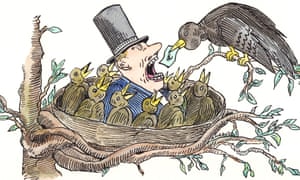
Aditya Chakrabortty in The Guardian
On Wednesday, two very different men will have to explain themselves. Both appear in London, to a room full of authority figures – but their finances and their status place them at opposite ends of our power structure. Yet put them together and a picture emerges of the skewedness of today’s Britain.
For the Rev Paul Nicolson, the venue will be a magistrate’s court in London. His “crime” is refusing to pay his council tax, in protest against David Cameron’s effective scrapping of council tax benefit, part of his swingeing cuts to social security. In order to pay for a financial crisis they didn’t cause, millions of families already on low incomes are sinking deeper into poverty. In order to pay bills they can’t afford, neighbours of the retired vicar are going without food. The 84-year-old faces jail this week, for the sake of £2,831.
Meanwhile, a chauffeur will drive Philip Green to parliament, where he’ll be quizzed by MPs over his part in the collapse of BHS. A business nearly as old as the Queen will die within a few weeks, leaving 11,000 workers out of a job and 22,000 members of its pension scheme facing a poorer retirement.
But then, Green is used to cherry-picking which rules he plays by. Take this example: he buys Arcadia, the company that owns Topshop, then arranges for it to give his wife a dividend of £1.2bn. Since Tina Green is, conveniently, a resident of Monaco, the tax savings on that one payment alone are worth an estimated £300m. That would fund the building of 10 large secondary schools – or two-thirds of the annual cut to council tax benefits.
Just as Green underinvests in society, so he underinvests in his companies. The man to whom he sold BHS last year, Dominic Chappell, told MPs last week that “for the past 10 or 12 years there had been little or no inward investment in the stores”. A staple of the high street had been run down.
Then again, what incentive has he had to do otherwise? Green bought BHS with just £20m of family money and borrowed the rest. Within four years, he had pulled £400m of dividends out of the firm – 20 times his initial outlay.
He used the same tactic to buy Arcadia – stumping up £9.2m in equity and taking out £1.2bn three years later. This isn’t retailing as you might think of it, it’s balance-sheet shazam – the kind of financial engineering that posed as real business in Britain’s bubble years. And it’s enabled Green to turn major retailers into what Robert Peston, in Who Runs Britain?, calls “giant gushers of cash”.
But in today’s Britain, the poor are forced to pay the unaffordable, while the tax-avoider is honoured for his contribution to society. Green was knighted by Tony Blair, while David Cameron appointed him a government adviser.
Just as Green pretends to be a cheeky chappy even though he went to boarding school, so any charlatan in pinstripes can claim to be a businessperson – and be handsomely rewarded. The barons who run our rail services tout themselves as “investors”, but for every quid they put into their trains, they take out £2.47. That level of underinvestment ensures commuters are never sure of getting in on time and having a seat – but shareholders and managers can make a fortune.
From Margaret Thatcher through Tony Blair to David Cameron, successive prime ministers have preached the virtues of free enterprise. We’ve ended up with an economy comprised of what parliament’s public accounts committee calls “quasi-monopolies” – from water to banks to electricity to public outsourcing – and big businesses being treated as money-sponges to be wrung dry by their owners and managers.
In the 1970s, £10 of every £100 in corporate profits was paid to shareholders. Now between £60 and £70 of every £100 is handed out. Workers, companies and the economy are thus starved of investment and growth opportunities so that, as Andy Haldane at the Bank of England warns, firms are “eating themselves”.
In an age of untrammelled greed, company executives are rewarded for cannibalising their businesses and bilking their staff. The typical FTSE-100 boss is now on a total pay of around £5m, the High Pay Centre calculates, even while the average employee is still earning less in real terms than in 2008.
This is less about the free market than freeloading. The banks collapse and are bailed out. The Sports Direct billionaire Mike Ashley walks away from a collapsed business, giving hundreds of workers 15-minutes notice of redundancy – and handing taxpayers the £700,000 bill to clean up the mess. Tax-avoider Amazon receives tens of millions of public money to build warehouses, and even has a road in Swansea built for it. Richard Branson takes £28m to open a call centre in Wales.
The public pay for apprenticeships, so that companies get readymade workers. We shell out for upgrading the railways. Most of all, we top up poverty pay. Official figures show that 37% of working-age households in this country now take more from the public purse than they pay in. Not because they’re lazy or unemployed – employment has never been so high – but because their bosses can rely on the rest of us to pay their way.
Survival of the fittest? This is a deformed capitalism, barely worthy of the name – and it won’t improve by slinging a few rotten tomatoes in parliament. We need a working capitalism, where the public no longer give away their protections and subsidies for free – but instead make businesses take their responsibilities seriously.
If rail operators rely on taxpayer billions, they should train staff and pay them a living wage. Why shouldn’t big supermarkets that need public planning permission and licensing to trade be required to stock some locally sourced goods? And why shouldn’t local and central government, which allocate billions in procurement and tendering, foster a diversity of business models – from not-for-profit to mutually owned.
Some of you may think such measures impossible, others may see them as baby steps. They should be the first heaves on the pendulum, turning our economy away from the interests of the wealthy to the rest of us.
Last week Nicolson promised: “I shall start paying my tax again when they stop taxing benefits.” Good for him. The rest of us taxpayers should do the opposite: asking businesspeople what they’ll do to deserve our corporate welfare. That question should not just be put to Green and Ashley, but to those who run all our major corporations. Otherwise, we’re merely chasing out a few big names and hanging up a sign over Britain that reads: “Under new owners, business as usual.”
Monday, 16 February 2015
Friday, 12 December 2014
Change the law on limited liability to control boardroom greed
Boardroom greed: how to bring an errant multinational to heel
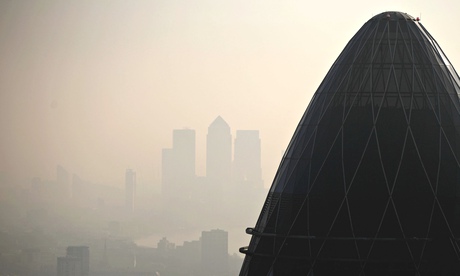
Friday, 7 November 2014
The British government is leading a gunpowder plot against democracy
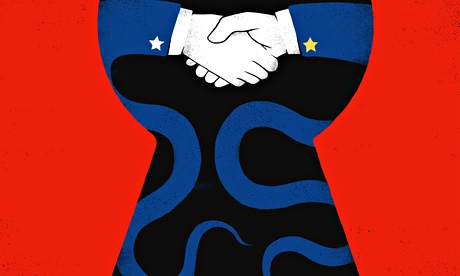
Saturday, 28 June 2014
The difference between Gordon Brown and Tony Blair
Gordon Brown is back, and may be the man to save the union
